Dealing with mold remediation can be expensive and time-consuming. But, can you write off mold remediation on taxes? Yes, you can, under certain conditions. The IRS sees mold remediation as a necessary repair, not just a way to improve your home’s value1.
This means you might be able to get a tax deduction for removing mold. But, you need to know what expenses qualify for this IRS deduction for mold treatment.
It’s important for homeowners to understand the tax side of mold remediation. This can help save money on taxes. The IRS says you can deduct not just the labor but also the materials used, which might be more if you hire professionals1.
Tax laws for mold remediation can change a lot depending on where you live2. So, it’s key to talk to an IRS expert or a tax preparer. They can give you advice tailored to your situation, even if it’s affected by natural disasters1.
Key Takeaways
- Mold remediation can be tax-deductible under certain conditions related to maintaining the home’s value1.
- The IRS classifies mold remediation as an essential repair, distinguishing it from renovations which are aimed at increasing property value1.
- Homeowners typically need to complete Form 4684 for casualty losses to claim mold remediation expenses1.
- Tax laws regarding mold remediation can vary significantly by state, affecting the deductibility of expenses2.
- Mold remediation projects can significantly impact both health and financial aspects for homeowners2.
- Consulting with an IRS representative or tax preparer is essential for personalized guidance on deductions1.
Understanding Mold Remediation
Mold remediation means getting rid of mold in buildings. It’s key for a healthy, safe place. Mold can make people sick, causing breathing problems and allergies. It’s important because it can harm workers and others, hurting the business3.
Homeowners can write off mold removal costs on taxes. But, knowing about mold remediation is vital for a successful tax write-off. Here are some important points:
- Mold remediation is a complex process needing special tools and skills3.
- The cost of fixing mold can be high, but it’s tax-deductible4.
- Homeowners might refinance to pay for mold removal, which can lower taxes4.
Mold remediation costs can be tax-deductible if documented right. Homeowners should talk to a tax expert. This ensures they get all tax breaks, like for mold removal5.
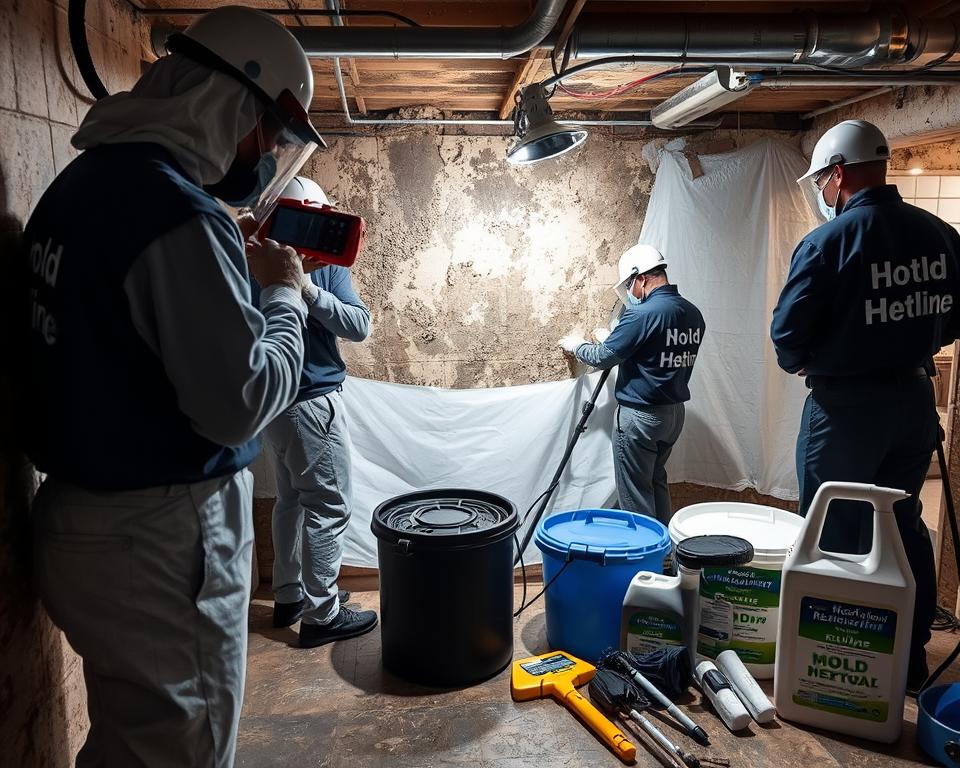
| Service | Description |
|---|---|
| Mold Remediation | Removing and cleaning up mold growth in a building |
| Mold Removal | Removing mold from a building, which can be claimed as a tax deduction |
Tax Deductions for Homeowners
Homeowners might get tax breaks for fixing mold. They can write off the cost of removing mold6. The IRS says fixing mold is a must to keep a home’s value6.
Knowing the difference between repairs and upgrades is key. Repairs can be written off, but upgrades can’t7. For instance, fixing a roof damaged by mold is a repair that can be deducted4.
Here are some things you can write off for mold fixes:
- Cost of removing mold and fixing it6
- Fixing damaged parts like drywall and floors7
- Buying tools and stuff for mold removal, like HEPA vacuums4
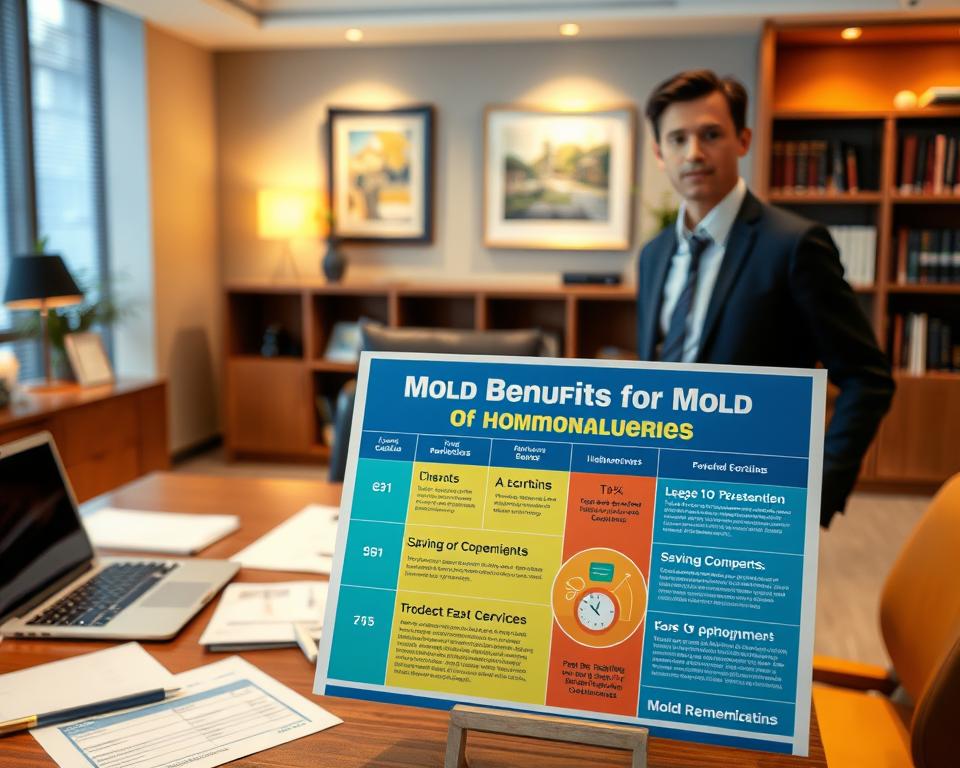
Keep all your receipts and invoices for mold fixes6. It’s smart to talk to a tax expert too7.
When Mold Remediation Qualifies for Deductions
Mold remediation can be very expensive for homeowners and landlords. But, it can be deducted from income taxes1. The IRS says mold removal is a necessary repair that can be deducted1.
To get deductions, the mold removal must keep the home livable. It can’t make the home more valuable8.
Homeowners can deduct it as a repair to keep the home livable8. Landlords can deduct it as a business expense8. The whole cost of mold removal, including labor and materials, can be deducted1.
People need to use Form 4684 to report mold removal costs1.
Deductions don’t apply if mold removal is part of a big renovation1. But, if it’s part of a renovation that makes the home more valuable, it can help with capital gains taxes1. To claim the tax credit or deduction, keep all your receipts and invoices8.
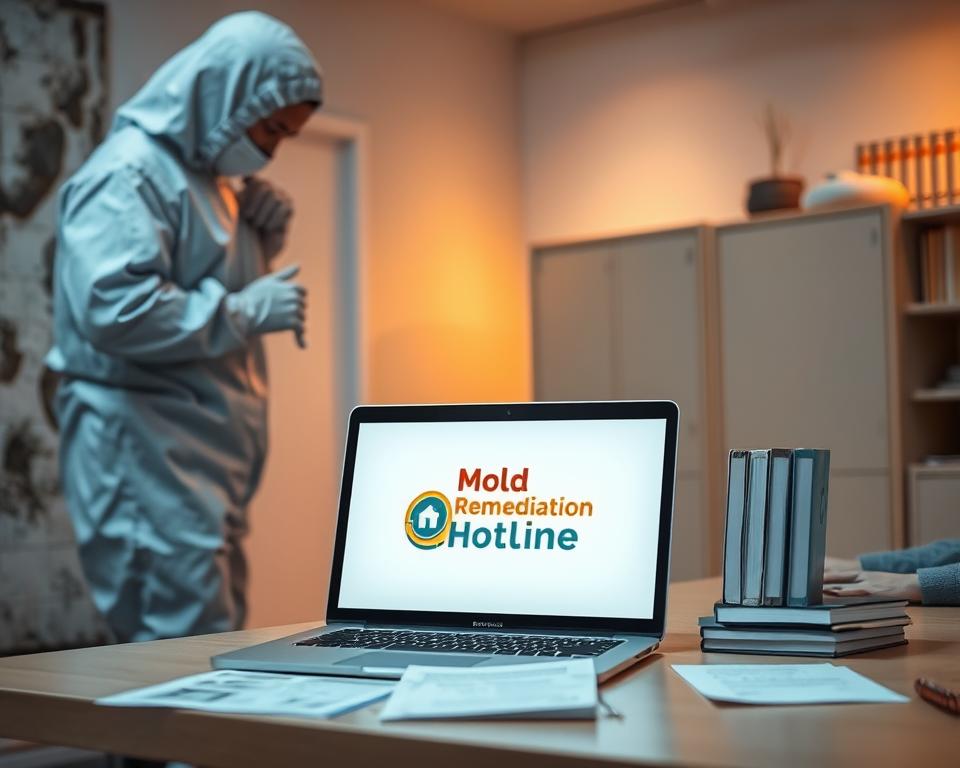
In conclusion, mold remediation can get tax deductions under certain rules. It’s important to know the IRS guidelines to claim the tax credit or deduction81.
IRS Guidelines on Home Repairs
The Internal Revenue Service has rules for home repairs. This includes tax breaks for mold removal. The IRS says mold removal can keep a home’s value9.
To get tax deductions, you must know what counts. The IRS lets homeowners deduct repair costs. This includes mold removal, if it keeps the home’s value10.
Important things to remember for tax deductions on mold removal are:
- Keep good records of your spending, like receipts and invoices
- Know the difference between repairs and improvements
- Talk to a tax expert to make sure you follow IRS rules
By following these tips, homeowners can get tax breaks for mold removal. This helps cover the cost of keeping their homes in good shape9.
Tax Deductions for Rental Properties
Rental property owners can write off mold removal costs as business expenses11. This includes the cost of removing mold. The IRS lets you deduct these costs to lower your taxes11.
To get these deductions, you need to keep good records12. You can deduct 100% of repair costs for regular upkeep12. But, big remodeling costs must be spread out over time12.
Some things you can write off include:
- Advertising
- Cleaning and maintenance
- Commissions paid to rental agents
- Insurance premiums
- Legal fees
- Mortgage interest
- Property taxes
- Utilities
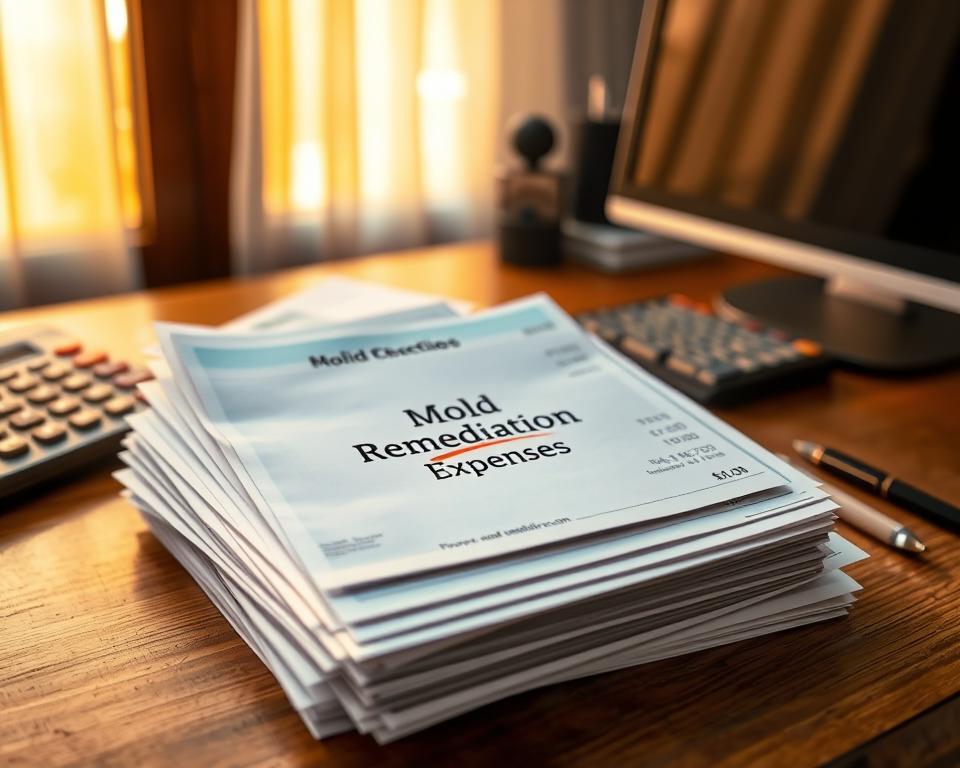
It’s key for rental owners to know about mold removal tax rules12. Keeping good records helps you use tax deductions12.
| Expense Type | Deductible Amount |
|---|---|
| Repair expenses | 100% of expenses incurred |
| Major remodeling expenses | Depreciated over 27.5 years for residential properties |
| Mold remediation expenses | Ordinary and necessary business expense |
Knowing about rental property tax deductions can save you money11.
Documentation Needed for Tax Deductions
To get the IRS mold remediation deduction, you need to keep good records. This includes receipts and invoices for mold removal costs13. These records help when you file for the mold treatment tax credit. Keep track of all mold removal costs. You can deduct these from your income.
It’s important to take before-and-after photos of the mold removal13. These photos prove the work was done. They can also help if you’re audited. Organize your documents well, either in a folder or digitally, for easy access.
Expenses like materials, labor, and equipment rental can be deducted13. You can also deduct the cost of hiring a professional for the assessment and removal. Always talk to a tax expert. They can help make sure you get all the deductions you’re eligible for.
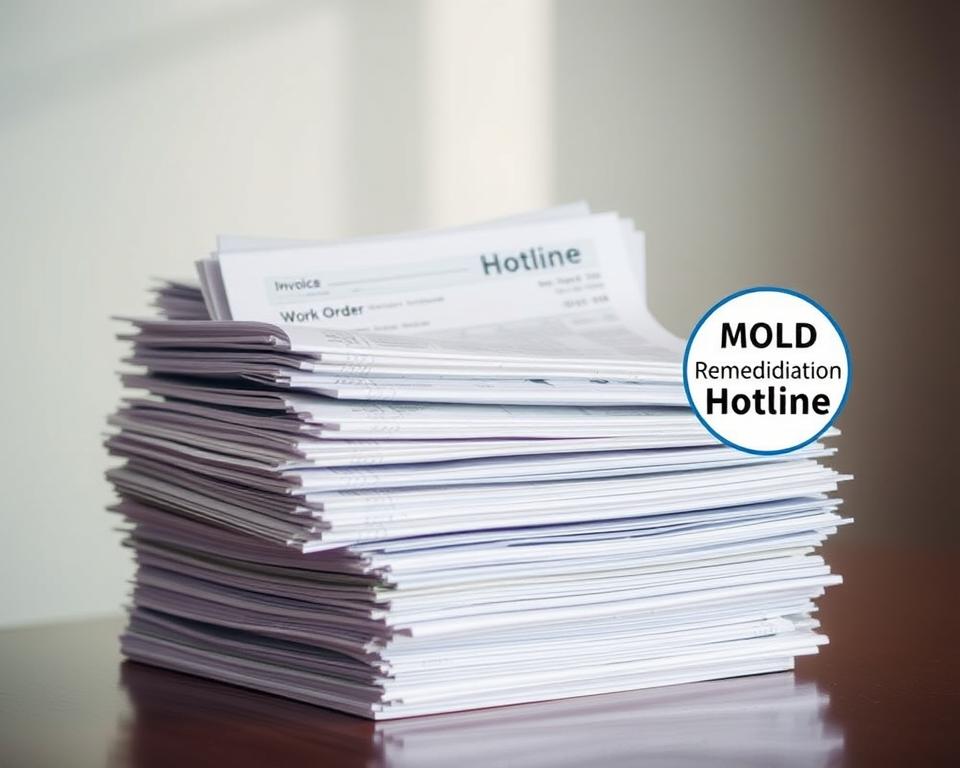
Running a Business from Home and Mold Remediation
Running a business from home has tax rules for mold remediation. Homeowners might get mold removal tax benefits. They can also deduct mold remediation costs as business expenses14. The IRS says mold removal and fixing costs are tax deductible14.
To get these tax breaks, a home area must be used only for business. This could be a home office or a special workspace. The deducting mold remediation costs can lower your taxes14.
Some things you can deduct include:
- Mold removal and fixing services
- Fixing damaged spots, like drywall or floors
- Replacing damaged stuff, like insulation or carpet
Keep good records of these costs. Include receipts and invoices to prove the deduction14.
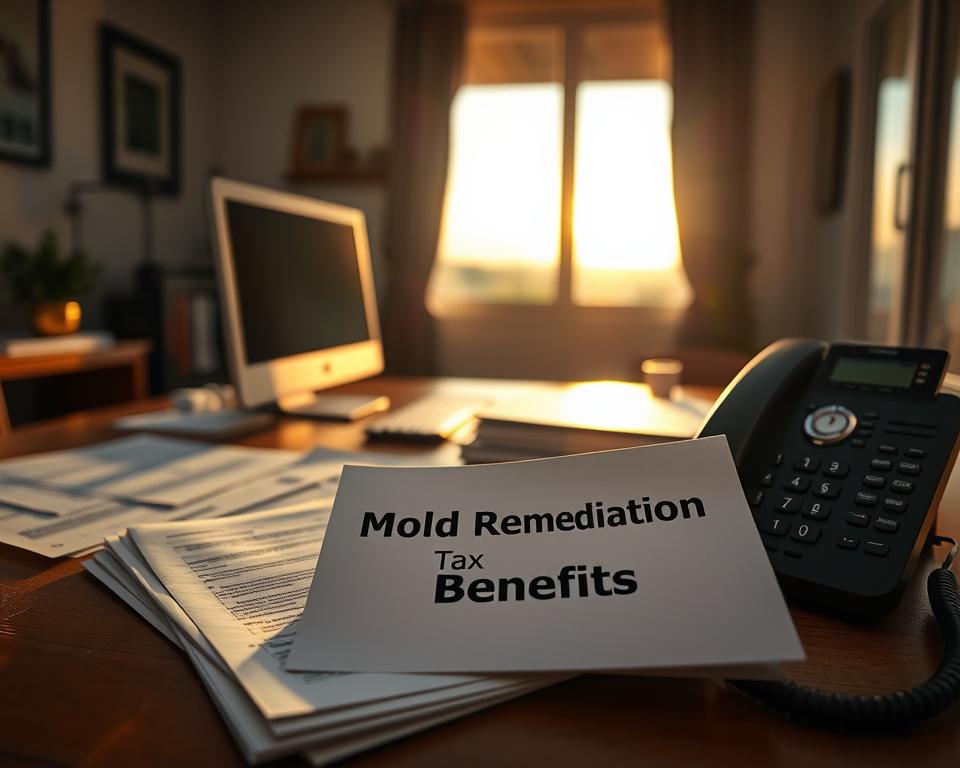
Mortgage Insurance and Homeowners Insurance
Homeowners might get help with moving costs if mold cleanup forces them to leave home7. This can change how much mold cleanup costs. Homeowners and mortgage insurance can help pay for these costs. It’s key to know what they cover and how to file claims or get tax deductions.
Some homeowners can write off mold cleanup costs on taxes15. But, it’s a bit tricky. You need to know IRS rules on fixing up your home. Getting a tax write-off for mold cleanup can help a lot. But, you must do it right to qualify.
Here are some important things to think about when dealing with insurance claims:
- Know what your homeowners insurance covers for mold
- Save all your receipts and expense records
- Talk to a tax expert to see if you can get tax deductions
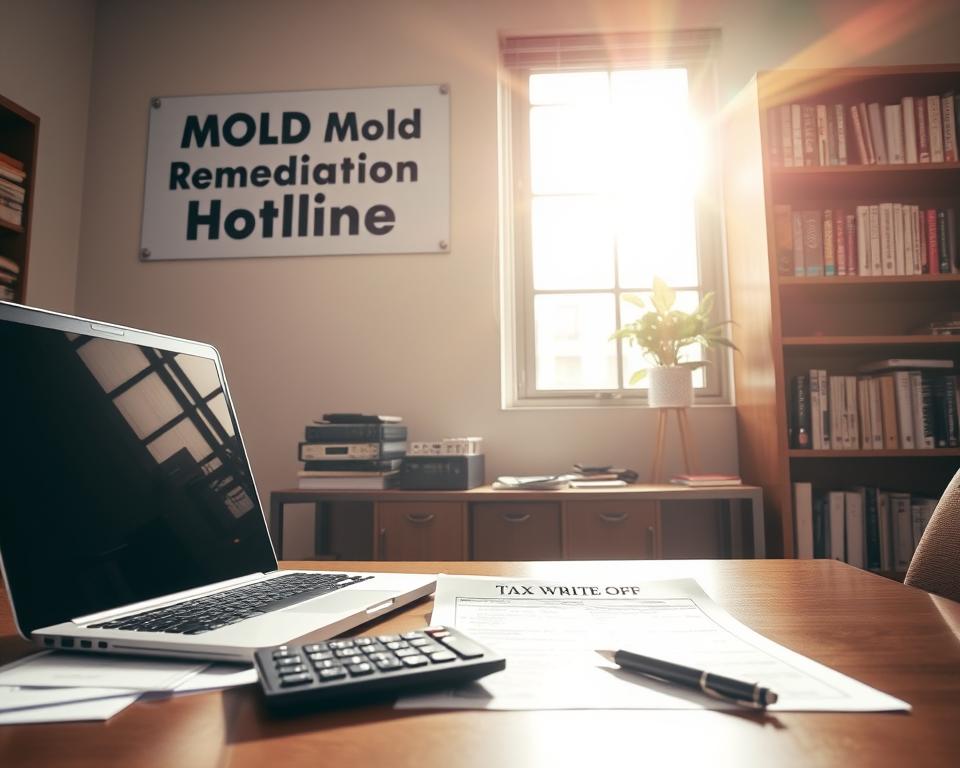
Understanding how mortgage and homeowners insurance work with mold cleanup is smart. It helps you make good choices about money. Always check your insurance and talk to a tax pro for the best results.
| Insurance Type | Coverage for Mold Remediation |
|---|---|
| Homeowners Insurance | Varies depending on policy |
| Mortgage Insurance | May cover relocation expenses |
State-Specific Regulations on Deductions
When you want to claim mold remediation on taxes, knowing state rules is key. You can deduct mold removal costs as a business expense16. But, each state has its own rules. You must check your state’s tax laws for mold removal deductions.
Some states have special rules for mold remediation and tax deductions. For instance, some states let homeowners deduct mold removal as a medical expense17. Others don’t. Always talk to a tax expert or use online guides to know your state’s rules.
To get all the deductions you can, follow these steps:
- Check your state’s tax laws on mold remediation and deductions.
- Ask a tax expert or use online guides for your state’s rules.
- Save all mold remediation expense records, like receipts and invoices.
By knowing your state’s rules and following these steps, you can get all the deductions you’re allowed for mold remediation on taxes.
| State | Mold Remediation Tax Deduction Rules |
|---|---|
| California | Allows homeowners to deduct the cost of mold remediation as a medical expense |
| New York | Does not allow homeowners to deduct the cost of mold remediation as a medical expense |
Always check with a tax expert or use online guides for your state’s mold removal tax deduction rules18.
Common Misconceptions About Tax Deductions
Homeowners often think they can deduct all mold remediation costs from taxes. But, this is not true19. The IRS says you can only deduct costs if they’re not part of a big renovation. It’s important to know the difference between fixing things and making big changes.
To avoid mistakes, keep good records of mold removal costs. This includes receipts and invoices. Talking to a tax expert can also help. They can make sure you’re using all the tax breaks you can, like for energy-saving upgrades20.
By understanding how to deduct mold treatment costs, you can save money. This makes your home safer and healthier too.
Some important things to remember when deducting mold treatment costs include:
- Only homes where you live can get tax credits for insulation and air sealing19.
- Business places have their own rules for tax credits19.
- Talking to a tax expert can help you understand tax deductions better20.
Consulting a Tax Professional
When you’re dealing with mold remediation tax credit, it’s smart to talk to a tax pro21. They can guide you through claiming deductions for mold removal costs. The IRS says you can deduct expenses for cleaning up the environment, like mold22.
A tax expert can figure out which costs you can deduct right away and which you have to save for later22. They’ll also help you keep records, like receipts and photos21. These records are important in case of an audit.
When picking a tax pro, look at their experience with mold tax credits21. Make sure they have the right credentials, like a CPA or EA22. A good tax pro will help you get all the deductions you can and avoid problems.
To find a good tax pro, ask people you trust for recommendations21. You can also check with groups like the AICPA or NAEA22. By doing your homework, you’ll make sure your mold removal costs are handled right and you get all the deductions you can.
Conclusion: Navigating Mold Remediation and Taxes
Mold remediation can be tricky when it comes to taxes23. The IRS lets you deduct some costs, but the rules can change. Homeowners need to know their options and talk to a tax expert to get the most benefits.
Key Takeaways
Important points from this article are about keeping records of mold removal costs24. It’s also key to know the difference between fixing things and making improvements. Plus, homeowners should watch out for rules in their state.
They should also think about tax rules for rental homes, home offices, and disaster relief.
Staying Informed for Future Tax Years
Tax laws and rules for mold remediation can change25. Homeowners need to keep up with new tax news. By doing this, they can make sure they use their mold removal costs wisely when they file taxes.
FAQ
Can mold remediation costs be deducted on taxes?
What types of mold remediation expenses can be deducted?
When does mold remediation qualify for tax deductions?
What documentation is needed to claim mold remediation as a tax deduction?
How do I claim mold remediation expenses on my tax return?
Should I consult a tax professional for guidance on mold remediation tax deductions?
Source Links
- https://moldremediationprosatl.com/are-mold-remediation-costs-tax-deductible/
- https://www.themoldpros.com/the-mold-pros-blogs/tax-talk
- https://fixmold.com/tax-deduction-for-mold-remediation-expenses/
- https://www.rightwaywaterproofing.com/how-will-my-mold-remediation-project-affect-my-taxes/
- https://www.irs.gov/pub/irs-drop/rp-98-47.pdf
- https://comptroller.texas.gov/taxes/publications/94-187.php
- https://turbotax.intuit.com/tax-tips/home-ownership/video-home-repairs-tax-deductions/L3b3cyQoJ
- https://www.thrivetaxadvisory.com/blog.php?id=6
- https://www.irs.gov/publications/p547
- https://www.pplcpa.com/452-2/
- https://www.houselogic.com/finances-taxes/taxes/rental-property-tax-deductions/
- https://www.realized1031.com/blog/can-i-deduct-remodeling-expenses-for-a-rental-property
- https://www.goodlifemgmt.com/blog/rental-property-deductions-checklist/
- https://www.thetaxadviser.com/issues/2023/may/deducting-costs-that-are-usually-capitalized.html
- https://www.renofi.com/renovation-loans/home-improvements-tax-deductible/
- https://19january2017snapshot.epa.gov/brownfields/brownfields-tax-incentive-frequently-asked-questions
- https://www.irs.gov/pub/irs-pdf/p547.pdf
- https://www.taxnotes.com/research/federal/treasury-decisions/irs-publishes-final-regs-deduction-and-capitalization-tangible-assets/czfg
- https://crawlspaceninja.com/insulation/insulation-tax-credits-2022-2023/
- https://cameronacademy.com/navigating-the-new-irs-1099-k-reporting-rules-what-freelancers-and-small-business-owners-need-to-know/page/30/?srsltid=AfmBOopBVuJuRszV2DK9rOjpzu0xceOS8lR18KjTGyaoStzw-PMvFHwc
- https://huddlestontaxcpas.com/blog/landscaping-and-pest-control-tax-deductible/
- https://www.hawkinsash.cpa/the-tax-impact-of-business-property-remediation/
- https://greatcoloradohomes.com/blog/tax-deductions-when-selling-your-home.html
- https://todayshomeowner.com/home-finances/guides/are-home-improvements-tax-deductible/
- https://www.pestco.com/deduct-pest-control/
